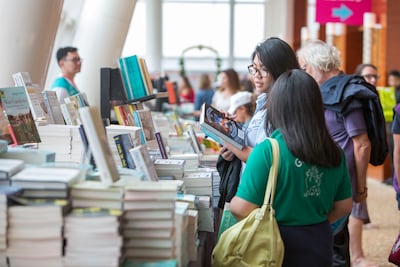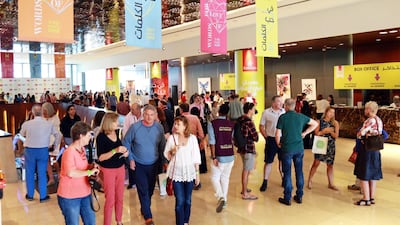Since the beginning of this year, social media has assailed me with articles and adverts for new diets, therapies, lifestyle changes and business advice. Some of it is wise and well-intentioned, some of it eye opening and borderline insane. I do not blame the marketeers for doing this because people in search of their new selves respond to these campaigns.
Perhaps millennials are driving this change, casting off old patterns and demanding flexible working hours. I don’t believe it is all millennials though, as optimism can transcend age and people of all ages are searching for something new.
And we see so many people who have achieved something incredible. At the festival just this year we have Sir Ranulph Fiennes who has traversed both poles; Edna Adan Ismail who has cut maternal mortality rates in Somaliland by one fourth; and Hazza Al Mansouri who was the first Emirati in space. You can hear them speak and meet them at the festival. In spite of their incredible achievements, they are people just like you and me. The world has become smaller and heroes have become relatable in a way they simply were not 50 years ago.
So now, anything might be possible, and I am searching for the new me. And because we live in a digital world, Google remembers that time I searched for vegan cheese and now I am seeing every advert from every brand jumping on the ‘veganuary’ bandwagon, or brandwagon. I am excited about vegan food without being vegan and I can’t wait for the BOSH! vegan supper club at the Emirates LitFest by authors and social media personalities Henry Firth and Ian Theasby. But I feel like we need some kind of quality control for the advice we are bombarded with.
But there is no quality control on the internet. Anyone can be a content creator, an editor and a creator of fiction, all without any approval processes or supervision. So the next best thing is to learn to decipher the information that is so readily available. I expect this will be a lifelong struggle, but so far, this is what I have learnt:
Read widely. Someone might make a good argument, but until you have considered a few other supporting or contradicting arguments, how can you know if you should believe it? The world is complicated, and the truth is not always intuitive. Seek out science, and make sure it isn't pseudoscience. Adam Rutherford's latest book, How to Argue with a Racist, uses science to debunk prejudice and racist ideas. The beauty of doing this is that the facts do all the hard work, not anecdotes or emotions.
Beware the easy answers. We are all searching for a better tomorrow and, if it were available online for Dh10.99, we would have bought it already. Given that we live in stressful times, we could all do with being less controlled by our environment and less troubled by uncertainty. Gelong Thubten gave up a career in acting to become a monk and now teaches mindfulness. His book, A Monk's Guide to Happiness, is helpful in learning to be present and worry less.

It is wise to seek out knowledge and listen to experts but it is also essential to listen more than one expert. Build your own bank of expert arguments and put them together to draw your own conclusions.
For example, we all need to worry about our planet; this much is clear. If we only listened to only one recycling expert, we might restrict ourselves and miss the perspectives of others. We might forget that nature contributes to our economy; and there are financial benefits to improving sustainability in all aspects of business. The niche experts are essential, but we need to weave a new blueprint from their combined knowledge.
With the Emirates LitFest on, this time of year is the most frantic for me but it is also one of my favourites. I try to go to as many sessions as possible, whether I know the author and the topic or not. I take it all in and then I process it gradually. Often, several months later, I have follow-up questions that may never get asked and that is okay. The compound effect of every single session and every single argument is that I am a little less susceptible to the easiest answers and a little more inclined to seek more information before I jump on the next bandwagon.
Ahlam Bolooki is festival director for Emirates Airline Festival of Literature


